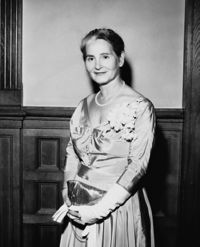Mary Turner Whitney, Beta Rho Deuteron, Cincinnati, (1902-1999)
The early ‘60s were troubled years for college campuses, but the challenges posed were met head on when Mary Turner Whitney served as President (1960-1964)
Mary had close to 40 years of Kappa experience when she was elected President of the Fraternity. A 1924 graduate of the University of Cincinnati, she had served as Pledge Trainer, Standards Chairman and Panhellenic Delegate while a collegiate member of Beta Rho. She also held offices in dramatic and literary societies and was a member of Mystic 13 (later Mortar Board).
After college, she taught school, married, had two sons and moved frequently in both the United States and Canada, which brought her in touch with many alumna groups, several of which she served as President. She became Beta Province President in 1948, Director of Chapters in 1950, and both Fraternity President and National Panhellenic Conference Delegate in 1954. (She served as NPC Delegate until 1961.)
Until 1954, the Vice President had presided over the Fraternity philanthropies area as her responsibility. But the creation of a Director of Philanthropies position freed the Vice President to assist the President with special assignments: Mary planned and executed a model initiation for the 1956 Convention, conducted a Kappa-wide campus survey of conditions affecting fraternities, and revised Province Officer manuals into a joint handbook for the Associate Council. These tasks influenced her Fraternity work for the next 20 years.
She was also appointed Kappa’s representative to NPC and in 1955 was assigned to the NPC Committee on College Panhellenics. These were significant times for Greeks and other voluntary private associations, forced to defend their rights of self-determination. Mary stayed on as NPC Delegate through the first year of her presidency to continue her committee work. During that year (1960-1961), she was assisted by Frances Fatout Alexander, Iota, DePauw, who served as Mary’s Vice President until Fran became NPC delegate in 1962.
At the dawn of the ‘60s, campuses were overcrowded and academic emphasis was heightened in light of Russia’s successful launch of Sputnik. In response, Mary’s Council came up with two goals for chapters: to develop greater interest and participation in the cultural aspects of their campuses and to simplify chapter organization and reduce non-essential activities. A new pledge handbook was prepared and a revised edition of Adventures in Leadership, first written in 1943, was published.
During Mary’s presidency, there was also a reemphasis on standards in all areas of the Fraternity program. “The College Fraternity System,” a series in The Key promoting these values, was acclaimed by administrators who received it.
The snowballing social revolution also brought into focus the question of fraternity autonomy. Attempts to regulate fraternities came not from administrators but from newly-empowered student government or student-faculty committees.
Many maintained frank and open communication with administrative officers, Kappa chapters and alumnae. Requested information about Fraternity policy was given only to proper authorities, and Kappa Kappa Gamma’s constitutional policies were unchallenged by any college or university. Insidious attempts from various sources to alienate chapters met with no success, and three new chapters, Epsilon Zeta -- Florida State, Epsilon Eta -- Auburn, and Epsilon Theta -- Arkansas at Little Rock, were installed between 1960 and 1964.
Mary’s firm belief in the value of Fraternity membership during those turbulent times of the ‘60s can be felt and heard in her own words… “If Kappa membership is to be of greatest value to our actives in the confusion and impersonal atmosphere of these crowded campuses, we must be aware of their needs and gear our programs to meet them. We believe we have a unique opportunity to provide for our active members an atmosphere in which they may grow personally and socially and intellectually in their development as educated women and informed citizens.”
“We are Kappas. One in spirit, we stand together, ‘henceforth, even forever.’ To have served my Fraternity has been an honor and a privilege.”
